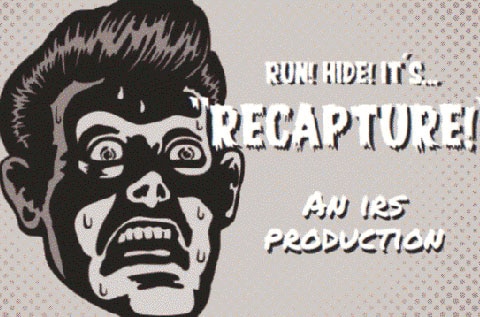
The Darker Side of Capital Gains Taxes: Depreciation Recapture
Many of your clients have a good handle on appreciation but are often clueless about depreciation. They either forget, or never really understood, that their annual income-tax deductions for depreciation come with a significant price: RECAPTURE.
Recapture is when your friend buys your lunch, and says “you can get it next time”, but repeatedly buys your lunch until you forget that you are supposed to buy your own lunch in the first place. Then one day he hosts a dinner party and gives you the entire bill. Although the amount of the dinner bill is less than the combined costs of all the lunches he paid for, in that moment all you can think about is the shock of paying a bill you did not expect to receive. Out of nowhere, your free lunches were just—BOOM!—recaptured.
Sadly, recapture tax is far more expensive than a dinner party.
Upon the sale of an investment property, depreciation-recapture taxes can potentially be higher than long-term capital gains taxes. After allowing investors to claim depreciation over years for a property whose value may not have been decreasing, the IRS wants its money back. The tax bill is perhaps not quite what one otherwise may have paid in income taxes, but it can be significant.
Each year that your clients claim depreciation to reduce their otherwise taxable income, they also reduce the “cost basis” of their original investment purchase. Cost basis is an accounting metric that starts as a real number (purchase price) and can increase based on more real numbers (such as a new roof or pool), but ultimately becomes somewhat notional after being adjusted for multiple annual depreciation deductions.
After 27.5 years of depreciation deductions, the cost basis of a residential rental can be reduced to zero. If sold without conducting a 1031 exchange, the property’s entire sales price may be taxable, with the entire original value being subjected to recapture tax—potentially at a higher tax rate than regular capital-gains tax.
Do not let your clients think they will pay no capital-gains tax, simply because their property has not appreciated. Depreciation may be lurking in the shadows, waiting to be recaptured.
This information is for educational purposes only and does not constitute direct investment advice or a direct offer to buy or sell an investment, and is not to be interpreted as tax or legal advice. Please speak with your own tax and legal advisors for advice/guidance regarding your particular situation. Because investor situations and objectives vary, this information is not intended to indicate suitability for any particular investor. The views of this material are those solely of the author and do not necessarily represent the views of their affiliates.
Investing in real estate and 1031 exchange replacement properties may involve significant risks. These risks include, but are not limited to, lack of liquidity, limited transferability, conflicts of interest, loss of entire investment principal, declining market values, tenant vacancies, and real estate fluctuations based upon a number of factors, which may include changes in interest rates, laws, operating expenses, insurance costs and tenant turnover. Investors should also understand all fees associated with a particular investment and how those fees could affect the overall performance of the investment.
Securities offered through Concorde Investment Services, LLC (CIS), member FINRA/SIPC. Advisory services offered through Concorde Asset Management, LLC (CAM), an SEC registered investment adviser. Insurance products offered through Concorde Insurance Agency, Inc. (CIA). 1031 Capital Solutions is independent of CIS, CAM and CIA.
continue reading
Related Posts
Changes are Happening Quickly – Don’t be Left Behind Managing […]
The Burdens of Managing Rental Property in Retirement Retirement should […]
Trusts, Partnerships and 1031 Exchanges One crucial aspect of real […]











